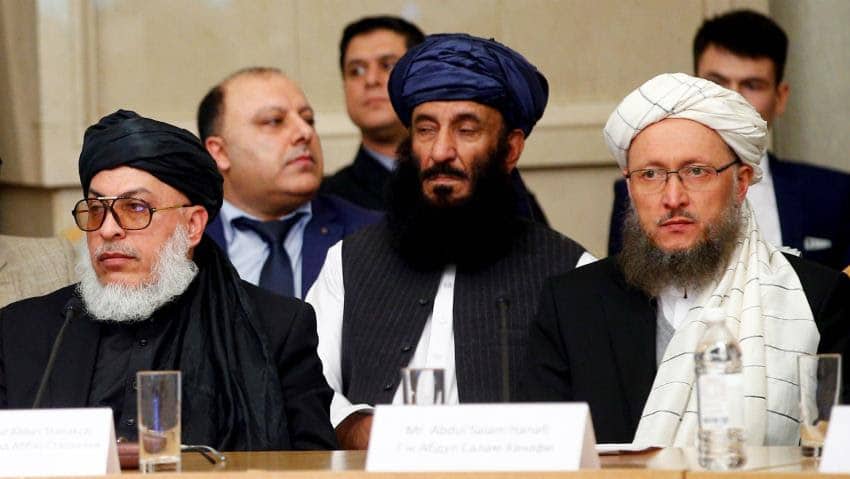Amidst the chaotic scenes that ushered in the Taliban’s take over of the Afghan capital Kabul, coupled with the West’s harried exodus from the city, the noticeable calm of Russian and Chinese officials stood out. Whilst nearly all Western nations have been busy evacuating and closing their diplomatic missions throughout Afghanistan, Moscow and Beijing have no such plans.
Russia is in the process of downsizing its diplomatic presence, but Moscow has also communicated that it has no intention of leaving Kabul. The Chinese have said, after the Taliban’s recapture of the city, that they do not plan to make any staff changes to their diplomatic presence in Afghanistan.
Commenting on the Taliban seizure of the whole of Afghanistan, Hua Chunying, a spokesperson for China’s foreign ministry, stated that Beijing is ready to develop “friendly and cooperative” relations with Afghanistan and “respects the wishes and choices of the Afghan people”.
China is Afghanistan’s main trade partner and its influence in the neighboring former Soviet Central Asian republics is rapidly expanding. Meanwhile, Russia, which has been engaged in talks with the Taliban for years and has been supplying them with weapons since at least 2015, called for calm and praised the Taliban for their fight against ISIS.
Both Russia and China are expected to officially recognize the Taliban as the legitimate government of Afghanistan. This may be surprising, considering that Russia has formally classified the Taliban as a terrorist organization, while the Chinese Communist Party has pointed a finger directly at the Taliban and accused the radical Islamist group of aiding the Uyghurs, the indigenous Muslim Turkic population of western China, in their separatist campaign that they have waged against Beijing for decades.
What has changed in that if the new rulers of Afghanistan stay clear of meddling in Russian and Chinese affairs, as they have promised, Moscow and Beijing have agreed to tolerate and, indeed, aid the Taliban regime.
Russia and China both see several major benefits in having the Taliban and its harsh very of Islamic fundamentalism hold sway over Afghanistan. Aside from Moscow’s “unfinished business” in Afghanistan after the Soviet Union’s defeat in the 1980s, the fall of Kabul means the end of two decades of American influence in what is considered by Moscow – and to a lesser extent, Beijing’s – to be their own backyard.
Moreover, the United States’ demise in the region is not only physical, but highly symbolic. The end of a Western presence means the defeat of the West’s rule-of-law, democratic govrernanc project for the region, which, had it worked, might have become infectious. This would have become a major threat to other autocracies in the region, nearly all of which are within Russia’s or China’s sphere of influence
The defeat of the Western project in Afghanistan helps the long-standing vested interests of Russia and China and gives them the option to succeed where the Americans – more specifically, the wider Western world – failed over the last 20 years.
Neither Moscow and Beijing care about the ruthlessness and brutality – let alone the human rights abuses – that have been and will be carried out by the Taliban. Both Russia and China are secular autocracies whose rulers detest religiously inspired theocracies. They ought, therefore, to dislike the Taliban. But like the new regime in Kabul, they also share the unwavering belief that rule by force is desirable and necessary to maintain domestic stability, particularly in a country like Afghanistan. Dictatorships, in their eyes, are more stable and more predictable and have the added benefit that they are adversaries of the liberal and democratic West.
Russia believes that the Taliban are mortal enemies of ISIS, with which the Taliban fought for supremacy in Afghanistan. Since Russia is deeply worried about ISIS’ potential influence in Russia’s restive North Caucasus, the Taliban, in the Kremlin’s eyes, can be a useful ally, at least for the time being.
There are several strong rationales for Moscow and Beijing to continue to invest in developing closer relations with the Taliban, and grow their influence in Afghanistan. The main question is whether the Taliban reciprocate. Certainly, Chinese (and, to a lesser extent, Russian) money will prove useful in an attempt to nation-build. Recognition will give the Taliban a veneer of legitimacy and the new theocratic government will enjoy using Russia and China to act as disruptive forces in the international arena, on the Taliban’s behalf.

A delegation of Taliban officials – led by Abbas Stanekzai (L), head of the Taliban’s political office in Doha, Qatar – prior to a meeting with Russian officials in Moscow on September 13, 2019.
Moscow and Beijing should, however, be mindful that whilst for now, the Taliban may need them to solidify their victory, at the end of the day the new rulers of Afghanistan are intensely ideological and xenophobic Islamists and are unlikely to concentrate on nation-building or refrain from spreading their ideology in the region.
Between 1996 and 2001 the Taliban’s Afghanistan served as a source of extremism and instability, including being the only nation to officially recognize the independence of Chechnya, which was in the process of fighting two devastatingly bloody separatist wars against Moscow at the time.
The Taliban’s activities at the time had profound implications for neighboring nations and, ultimately, further afield. There is little to suggest that this time around the Taliban’s rule will be any different. The enemy of an enemy can sometimes be useful, but they will not necessarily be your friend.
-------------------------------------------
By: Nicholas Waller
Title: Russia and China poised to gain influence in Afghanistan
Sourced From: www.neweurope.eu/article/russia-and-china-poised-to-gain-influence-in-afghanistan/
Published Date: Wed, 18 Aug 2021 15:15:48 +0000
Read More
Did you miss our previous article...
https://badpoliticians.com/uk-politics/europe-has-been-prompted-to-reflect-on-the-unrest-in-america-by-soulsearching
 UK PoliticsWorld PoliticsVideosPrivacy PolicyTerms And Conditions
UK PoliticsWorld PoliticsVideosPrivacy PolicyTerms And Conditions
